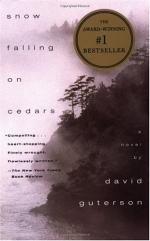|
This section contains 971 words (approx. 4 pages at 300 words per page) |

|
The Ironies of War
Summary: Snow Falling on Cedars (Gutterson) and "The Lies of War" (Owen), both reveal the belief that the atrocities committed in a war are those committed in every other war, regardless of time, what war or who is fighting. There is a level of communication or bonding that can only exist between veterans of war.
No matter the army, the time period, or the outcome, the atrocities committed in a war are those committed in every other war: the pain and the bloodshed are always present. Only a veteran can empathize with another veteran's war stories; the carnage experienced as a soldier creates a common bond between those who have experienced it, and this is why Kabuo Miyamoto could completely identify with Wilfred Owen's poem "The Lies of War."
Although they fought in two different wars, against two different armies, although they fought for two different countries, both Kabuo and Owen witnessed death in action, and were forced to live with this experience until their own lives ended. Owen's poem depicts the irony of a soldier's fate: the "children ardent for some desperate glory" (Lies.26) are seen as "old beggars, ... knock-kneed, coughing like hags" (Lies .1-2). That it is ¨sweet and becoming to...
|
This section contains 971 words (approx. 4 pages at 300 words per page) |

|


